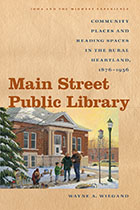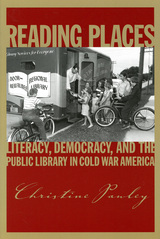3 books about Rural libraries

Main Street Public Library
Community Places and Reading Spaces in the Rural Heartland, 1876-956
Wayne A. Wiegand
University of Iowa Press, 2011
The United States has more public libraries than it has McDonald’s restaurants.
By any measure, the American public library is a heavily used and ubiquitous institution. Popular thinking identifies the public library as a neutral agency that protects democratic ideals by guarding against censorship as it makes information available to people from all walks of life. Among librarians this idea is known as the “library faith.” But is the American public library as democratic as it appears to be?
In Main Street Public Library, eminent library historian Wayne Wiegand studies four emblematic small-town libraries in the Midwest from the late nineteenth century through the federal Library Service Act of 1956, and shows that these institutions served a much different purpose than is so often perceived. Rather than acting as neutral institutions that are vital to democracy, the libraries of Sauk Centre, Minnesota; Osage, Iowa; Rhinelander, Wisconsin; and Lexington, Michigan, were actually mediating community literary values and providing a public space for the construction of social harmony. These libraries, and the librarians who ran them, were often just as susceptible to the political and social pressures of their time as any other public institution.
By analyzing the collections of all four libraries and revealing what was being read and why certain acquisitions were passed over, Wiegand challenges both traditional perceptions and professional rhetoric about the role of libraries in our small-town communities. While the American public library has become essential to its local community, it is for reasons significantly different than those articulated by the “library faith.”
[more]

Reading Places
Literacy, Democracy, and the Public Library in Cold War America
Christine Pawley
University of Massachusetts Press, 2010
This book recounts the history of an experimental regional library service in the early 1950s, a story that has implications far beyond the two Wisconsin counties where it took place. Using interviews and library records, Christine Pawley reveals the choices of ordinary individual readers, showing how local cultures of reading interacted with formal institutions to implement an official literacy policy.
Central to the experiment were well-stocked bookmobiles that brought books to rural districts and the one-room schools that dotted the region. Three years after the project began, state officials and local librarians judged it an overwhelming success. Library circulation figures soared to two-and-a-half times their previous level. Over 90 percent of grade-school children in the rural schools used the bookmobile service, and their reading scores improved beyond expectation.
Despite these successes, however, local communities displayed deeply divided reactions. Some welcomed the book-mobiles and new library services wholeheartedly, valuing print and reading as essential to the exercise of democracy, and keen to widen educational opportunities for children growing up on hardscrabble farms where books and magazines were rare. Others feared the intrusion of govern- ment into their homes and communities, resented the tax increases that library services entailed, and complained about the subversive or immoral nature of some books.
Analyzing the history of tensions between various community groups, Pawley delineates the long-standing antagonisms arising from class, gender, and ethnic differences which contributed to a suspicion of official projects to expand education. Relating a seemingly small story of library policy, she teases out the complex interaction of reading, locality, and cultural difference. In so doing, she illuminates broader questions regarding libraries, literacy, and citizenship, reaching back to the nineteenth century and forward to the present day.
Central to the experiment were well-stocked bookmobiles that brought books to rural districts and the one-room schools that dotted the region. Three years after the project began, state officials and local librarians judged it an overwhelming success. Library circulation figures soared to two-and-a-half times their previous level. Over 90 percent of grade-school children in the rural schools used the bookmobile service, and their reading scores improved beyond expectation.
Despite these successes, however, local communities displayed deeply divided reactions. Some welcomed the book-mobiles and new library services wholeheartedly, valuing print and reading as essential to the exercise of democracy, and keen to widen educational opportunities for children growing up on hardscrabble farms where books and magazines were rare. Others feared the intrusion of govern- ment into their homes and communities, resented the tax increases that library services entailed, and complained about the subversive or immoral nature of some books.
Analyzing the history of tensions between various community groups, Pawley delineates the long-standing antagonisms arising from class, gender, and ethnic differences which contributed to a suspicion of official projects to expand education. Relating a seemingly small story of library policy, she teases out the complex interaction of reading, locality, and cultural difference. In so doing, she illuminates broader questions regarding libraries, literacy, and citizenship, reaching back to the nineteenth century and forward to the present day.
[more]

The Small And Rural Academic L Library
Leveraging Resources
Kaetrena Davis Kendrick
Assoc of College & Research Libraries, 2016
READERS
Browse our collection.
PUBLISHERS
See BiblioVault's publisher services.
STUDENT SERVICES
Files for college accessibility offices.
UChicago Accessibility Resources
home | accessibility | search | about | contact us
BiblioVault ® 2001 - 2024
The University of Chicago Press









